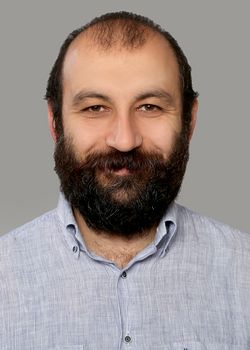Dr. Salim Çevik
Türkei/CATS Gastwissenschaftler
Forschungsgebiete
- Türkei
- Eliten und Elitenwandel
- Menschenrechte
- Politische Ordnungen
- Politischer Islam / Islamismus
- Populismus
- State- und Nationbuilding
Staat und Religion, Islamistische Bewegungen, Politischer Islam, Innenpolitik, Populismus, Nationalismus, Türkei im Nahen Osten
Kurzlebenslauf
2020-2023 Wissenschaftler am Centrum für angewandte Türkeistudien (CATS), SWP
2016-2017 Post-Doc-Stipendiat am Zentrum für Nahoststudien der Universität Lund, Schweden
2013-2016 Dozent an der politikwisschenschaftlichen Fakultät der Ipek-Universität, Türkei
2011-2012 Gastwissenschaftler am Zentrum für Nahoststudien der Universität Lund, Schweden
2009-2011 Forschungsassistent an der Bilgi-Universität, Istanbul, Türkei
2008-2009 Gastwissenschaftler an der Columbia-Universität, USA
SWP-Publikationen
-
Turkey’s Authoritarian Turn: İmamoğlu’s Arrest and Europe’s Strategic Dilemma
Erdoğan expects that Turkey’s rising importance in the security realm will force Europe to ignore his crackdown on the opposition. But without basic democratic foundations, Turkey cannot be a credible security partner, say Hürcan Aslı Aksoy and Salim Çevik.
Point of View, 25.03.2025 -
Turkey’s Authoritarian Drift Accelerates: Istanbul Mayor Faces Imprisonment
Erdoğan’s government is tightening its grip on power, using the judiciary to sideline key opposition figures like Istanbul Mayor Ekrem İmamoğlu. This represents another step toward full authoritarian rule, say Hürcan Aslı Aksoy and Salim Çevik.
Point of View, 26.02.2025 -
From Biden to Trump: Waning Turkish‑American Relationship Demands Greater European Engagement
SWP Comment 2024/C 54, 09.12.2024, 7 Seitendoi:10.18449/2024C54
-
Turkey’s Reconciliation Efforts in the Middle East
Ambitions and Constraints in a Changing Regional Order
SWP Research Paper 2024/RP 15, 14.10.2024, 31 Seitendoi:10.18449/2024RP15
-
Turkey after the local elections: How Erdoğan‘s defeat could change domestic and foreign policy
Turkey’s political landscape is shifting. President Erdoğan and his AKP party suffered their biggest defeat in more than two decades at the country’s recent municipal elections. Turkey’s western allies will be looking to see whether the changing tide at home may affect Ankara’s foreign policy.
SWP Podcast 2024/eP 02, 25.04.2024 -
Turkey’s New Cabinet
A Wind of Change in Turkish Politics?
SWP Comment 2023/C 42, 19.07.2023, 7 Seitendoi:10.18449/2023C42
Externe Veröffentlichungen
-
Beyond Gaza: The Strategic Fault Lines in Turkey–Israel Relations
in: Arab Center Washington DC, 02.10.2025 -
Erdogan Considers the Kurdish Question: The PKK ceasefire and the Kurdish future in Turkey
in: The New Arab, The New Arab Voice, 09.08.2025 (audio) -
Moderation Without Transformation: Why Turkey Is Failing Syria’s Postwar Transition
in: Arab Center Washington DC, 08.08.2025 -
As the PKK Disbands, Erdoğan Tightens His Grip on Türkiye
in: Bertelsmann Transformation Index, Analysis, 30.07.2025 -
Turkey’s Repositioning in the Middle East’s Emerging Order
in: Arab Center Washington DC, 17.06.2025 -
The Arrest of Ekrem Imamoglu: A Critical Turning Point in Turkey’s Politics
in: Arab Center Washington DC, 29.03.2025
